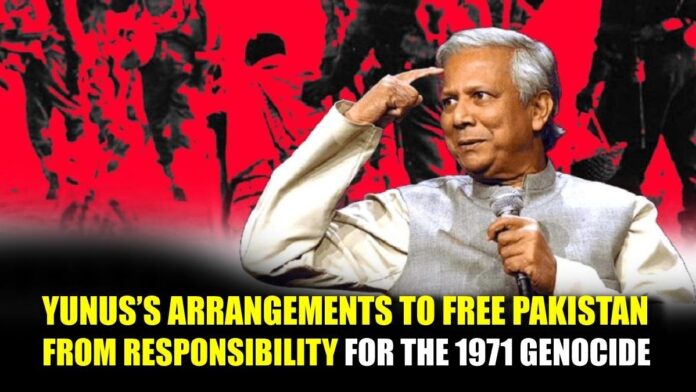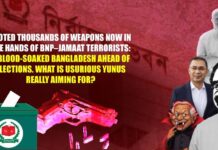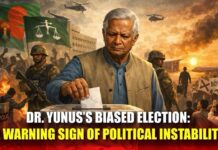During the 1971 Liberation War, Pakistani soldiers and their collaborators carried out genocide in Bangladesh, killing about 3 million people and raping 200,000–400,000 women. Even after independence, Pakistan never formally apologized or acknowledged its crimes. Yet, after the political changes of August 5, efforts are underway to revive Bangladesh’s relationship with Pakistan. Behind this stands the interim government, along with pro-Pakistan parties like BNP and Jamaat-e-Islami.
Recently, steps taken under the leadership of interim government head Dr. Muhammad Yunus have sparked controversy. Strengthening diplomatic ties with Pakistan and China, and the visible strains in relations with India, have led many to think this is an attempt to re-establish ties with Pakistan while deliberately sidelining the unresolved genocide issue of 1971.
Since coming to power, the interim government has publicly said Pakistan must apologize. But after a recent secretary-level meeting between the two countries, the Bangladeshi side made loud claims about demanding an apology for wartime atrocities and unpaid pre-independence assets. However, Pakistan’s official statements made no mention of these issues.
While Pakistan has brushed aside the question of apology, the government here is playing a deceptive game. It wants to convince the people that it is pushing for a formal apology, while in reality signing a series of agreements with Pakistan: visa waivers for holders of official and diplomatic passports; formation of a joint trade working group; cultural exchange programs; cooperation between foreign service academies; collaboration between state news agencies; and institutional cooperation between the Bangladesh Institute of International and Strategic Studies and Pakistan’s Islamabad Policy Research Institute (IPRI).
Bangladesh is also extending various forms of assistance. Pakistan has announced 300 full scholarships for Bangladeshi students in its top universities. Plans are underway to quadruple bilateral trade annually. According to Pakistan’s trade authorities, it already has billions of dollars invested in Bangladesh’s leather, textile, and garment sectors. Pakistan’s information minister Ataullah Tarar recently discussed cultural exchanges with Bangladesh’s cultural adviser, Mustafa Sarwar Farooki. Direct Dhaka–Islamabad flights are also being planned to boost people-to-people contact.
Liberation War organizations in Bangladesh and abroad continue to demand an official apology from Pakistan, but Islamabad has never accepted responsibility. Analysts say that without recognition of genocide and an apology, full normalization of Bangladesh–Pakistan ties is impossible. Yunus’s government faces the challenge of ensuring historical justice while balancing foreign relations.
Intensified Diplomatic Activity
Despite Pakistan’s refusal to apologize, the interim government is eager to mend ties. Pakistani ministers are making frequent visits. On August 23, Deputy Prime Minister and Foreign Minister Ishaq Dar arrived in Dhaka for a three-day trip—the first visit by a Pakistani foreign minister in 13 years.
During his stay, he is expected to meet BNP Chairperson Khaleda Zia and Jamaat-e-Islami leaders. Sources suggest his visit is tied to Pakistan’s mission of destabilizing India by using Bangladesh, particularly if BNP returns to power. The 10-truck arms case of April 1, 2004—Bangladesh’s largest ever arms haul—was evidence of this. Analysts note that this case marked the beginning of strained ties between the BNP government and India at the time.
Ahead of Ishaq Dar’s trip, some Pakistani media outlets openly called for reintegrating Bangladesh with Pakistan, dismissing the Liberation War as an “Indian conspiracy” and denying Pakistani military war crimes.
Meanwhile, Jamaat leaders have been publicly referring to Bangladesh as “Pakistan,” and student wing Shibir even sent representatives to Pakistan. They faced criticism for holding a campus exhibition that whitewashed war crimes. Yet the interim government has remained silent, which critics say reduces the demand for apology to a farce.
Recently, Jamaat was even granted permission to hold a rally at Suhrawardy Udyan for the first time, sparking widespread debate. The sudden departure of Pakistan’s outgoing ambassador and personal scandals surrounding him have also drawn attention. Overall, critics believe Pakistan, Jamaat, and Shibir are trying to reassert influence in Bangladesh, and the government’s silence is enabling it.
The Shadow of Conspiracy
Fifty-four years after independence, new evidence suggests a grave conspiracy to turn Bangladesh back into Pakistan. Recent diplomatic and military contacts, foreign funding, and political-intelligence activity from Islamabad have raised alarm.
Two Pakistani ministers visited Dhaka within just two days: Commerce Minister Jam Kamal Khan on August 21, and Foreign Minister Ishaq Dar on August 23. Earlier, Pakistan’s interior minister Syed Mohsin Raza Naqvi visited Dhaka in July, claiming both countries would work together on counterterrorism—an idea critics found absurd, given Pakistan’s deep-rooted links with militant groups. In April, Pakistan’s foreign secretary Aamna Baloch also visited Dhaka, aiming to “revive relations.”
Aggressive Messaging in Pakistani Media
Pakistani news outlet The Catchline recently published an article branding Bangladesh’s independence as an Indian conspiracy and declaring, “It is time to restore East Pakistan to its rightful place.” The piece even suggested reinstating former Bangladeshi military officer Abdullahil Amaan Azmi as national security adviser—signaling that sections of Pakistan still view Bangladesh as “lost territory.”
Suspicious Military Visits
In June, three Pakistani brigadiers visited Dhaka and went directly to the Ramu Cantonment in Cox’s Bazar, headquarters of the 10th Infantry Division. A retired Bangladeshi major general remarked: “They were clearly on a covert mission—why else suddenly visit such a sensitive base?”
Given that Ramu is known as a hub for contacts and supplies to the Arakan Army, many see this as part of a hidden military agenda rather than routine diplomacy.
Conclusion
Political analysts warn that the sudden warmth toward Pakistan has unsettled the Bangladeshi public. Signing agreements and exchanging visits without Pakistan’s apology or recognition of genocide means ignoring history. It dishonors the martyrs’ sacrifices and absolves Pakistan of responsibility.
Observers believe the Yunus government is playing a “double game”: projecting a tough stance on Pakistan in public while quietly deepening ties in private. This only paves the way for Pakistan’s absolution from genocide.
In the long run, such diplomacy could weaken Bangladesh’s national interests. The 1971 genocide is not just history—it is bound up with the nation’s identity, dignity, and diplomatic strength.





